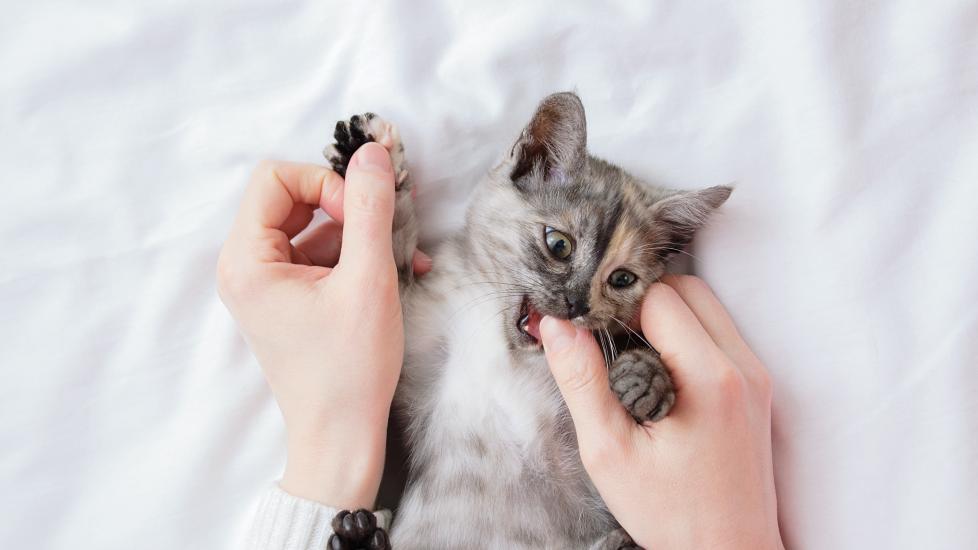Cat Love Bites: Why They Happen and How To Respond
Iuliia Alekseeva/iStock / Getty Images Plus via Getty Images
Have you ever found yourself on the receiving end of gentle nibbles from your feline companion? Often referred to as “love bites,” these delicate gestures are a unique form of communication that allow your cat to express their feelings and needs. Here’s what to know about cat love bites.
What Are Cat Love Bites?
Love bites are when a cat gently places their mouth on their humans. While they typically don’t break the skin or cause harm, love bites may catch you off guard due to the sharpness of your cat’s teeth.
Some cats may gently lick or groom you before progressing to a nibble. These bites often occur during moments of petting when the cat appears relaxed and comfortable.
Why Do Cats Love-Bite?
There isn’t a straightforward answer to why cats give love bites. As the term implies, some cats give them as a sign of affection or bonding, expressing their fondness for their human companions. But cats may also engage in this subtle biting behavior to convey other feelings, such as when they are:
-
Overstimulated by petting
-
Frustrated
-
Seeking attention
-
Displaying innate predatory or play behavior
Understanding the rest of the cat’s body language and the context in which the love bite occurs is essential for knowing the motivation behind each bite. For instance, your cat may love-bite as a subtle request to end a lengthy petting session or as a plea for prolonged affection.
Cat Love Bites vs. Real Bites
Distinguishing between love bites and real bites, which are more forceful and indicate threat or fear, is important for cat parents to ensure the safety and well-being of everyone involved in human-cat interactions.
Cats bite when they want an interaction or situation to stop due to fear, anxiety, and/or pain. Real bites are often accompanied by other body language indicating fear and aggression, including:
-
Dilated pupils
-
Flattened ears
-
Piloerection (hair standing up on end)
-
Tail twitching
How To Respond to Cat Love Bites
Your response to love bites depends on:
-
Your cat’s motivation for the behavior
-
Whether you find the behavior pleasurable or irritating
If you enjoy nibbles that are accompanied by grooming and purring, then the behavior may be a welcome interaction. However, if discomfort, frustration, or boredom is the root cause, or if the bites become bothersome or painful, certain strategies can help reduce or eliminate the biting behavior:
1. Know Your Cat’s Body Language
Understanding your cat’s body language is key to preventing love bites altogether. Pay attention to their tolerance for petting and heed warning signs that they’ve had enough, such as muscle tension, a twitching tail, or dilated pupils.
In general, keep petting sessions short and avoid sensitive areas, such as the belly. Allowing your cat to initiate contact may also minimize love bites.
2. Teach Your Cat What’s Acceptable to Bite
Engaging your cat in mentally and physically enriching activities, such as play sessions, food puzzles, cat-safe plants such as silvervine, and climbing perches can also stop love bites. Do not encourage your cat to play with any human body parts, including your hands.
3. Know How To React
Reacting appropriately to love bites maintains a positive relationship with your cat. Ideally, redirect your cat’s attention by offering a toy or tossing treats to disengage them.
If that’s not possible, then freeze and allow the cat to disengage before calmly moving away, as sudden movements may trigger hunting instincts that could lead to a deeper, more dangerous bite.
Physical retaliation or punishment, such as scolding, grabbing, squirting with water, or striking the cat, can cause them to escalate to aggression. If the bite penetrates the skin, wash the wound immediately and thoroughly with soap and water and seek prompt medical attention to prevent infection.
Cat love bites are a normal—and often charming—aspect of feline behavior. However, if unwanted biting behavior persists or intensifies, consult a veterinarian to make sure that any underlying issues are addressed.
By decoding the messages behind these gentle nibbles, cat parents can strengthen their bond with their furry companions.
